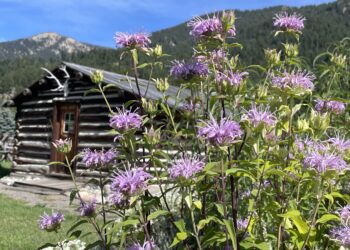By Dave Marston WRITERS ON THE RANGE

Why would rural Delta County, Colorado, say no to a solar farm that would enrich the county by $13 million over 15 years, at roughly the same time neighboring Montrose County said yes to a solar farm that might power nothing but the energy-draining cryptocurrency industry?
In early March, Delta County commissioners voted 2-1 to deny a 472-acre solar array built by Guzman Energy, a move that would help shift the local rural electric cooperative, Delta-Montrose Electric Association, to clean energy. Many locals found the no vote not only mystifying but also infuriating.
Unlike Guzman Energy, which financed DMEA’s exit from its former power supplier, Tri State Generation and Transmission, the business called Co Mine 1 Landco LLC in Montrose is secretive, though crypto mining, aka validating cryptocurrency transactions, is the likely use, according to the Colorado Sun. The Sun points out that the company’s vagueness failed to trouble the Montrose County Planning Commission, which recently approved CO Mine 1 Landco LLC’s land-use change.
As for Guzman’s failure in Delta County, “The problem is some (people) got political, just because it was solar,” says Delta County Commissioner Don Suppes, the sole yes vote. “We’re sending the wrong message that we don’t want people investing in Delta County,” he says.
Delta County is culturally split. Up valley, in the North Fork of the Gunnison Valley, residents support solar power and there is a thriving solar installation school, Solar Energy International, in the town of Paonia. Down valley is a more conservative, row-cropping and family-values community. The County votes 70 percent Republican.
But the consensus, at least until now, was that the electrical co-op was a local champion, serving both Delta and Montrose with electrical power and fast Internet.
Producing electrical power from home is the holy grail of the energy transition, so Guzman’s plans seemed tailored to Delta County, a right to farm community. Sheep could graze among the solar panels, says Suppes, and “it was still grazing—just as critical as row crops.”
How did these two counties, neighbors with similar geography, come to hold such starkly different worldviews?
You could say that Montrose County started with a deprived childhood. When white families forced out the Indigenous tribes and moved into Western Colorado in the late 1800s, Delta County prospered. Some came equipped, backed by Eastern money, with nothing more than pick, shovel, or if lucky—mule scrapers. They dug miles of ditches below the West Elk Mountain range that brought water down for imported fruit trees. Coal in those same mountains was found early and mined.
Meanwhile, Montrose was left in their dust. No pick or shovel could divert water that simply did not exist in the barren Uncompahgre Valley.
Montrose land speculators’ lobbying efforts paid off in 1909, when the Bureau of Reclamation finished the Gunnison Tunnel, sending 500,000 acre-feet of Gunnison River water annually to Montrose County, turning the valley into an agricultural force.
Right now, the two counties are neck and neck based on household income, though Montrose County is better at creating jobs. Its major town, Montrose, bustles with outdoor equipment businesses and an airport favored by the resort town of Telluride.
Delta County, in its North Fork, boasts vineyards and organic agriculture, a sizable number of internet workers and a growing summer tourist trade. But Delta County still chases Montrose when it comes to economic growth.
“Delta has a long history of turning stuff away that ends up in Montrose,” says Suppes, pointing out that in 1973, Russell Stover Candies wanted to build its factory (closed in 2020) in Delta, but was turned down, so chose Montrose.
In the early 1980s, Louisiana-Pacific looked in the Delta-Montrose area for an oriented strand board plant, or OSB, location. Manufacturing OSB—a substitute for plywood—involves brewing toxic resins with wood chips.
LP chose Montrose County, which agreed with the caveat, legend has it, that the giant glue factory situate far from downtown Montrose. The Delta-Montrose County line, where the plant landed, is just seven miles from the town of Delta compared to 14 miles from Montrose. Like it or not, Delta got the criminally polluting factory, now closed.
The former LP plant now hosts the crypto mine.
In Delta County, Guzman is certain to keep looking for a home for its solar farm, and Commissioner Suppes is convinced that now, Delta will say yes. Perhaps this time Delta County can get both the solar plant and the tax revenue.
Dave Marston is the publisher of Writers on the Range, writersontherange.org, a nonprofit dedicated to spurring lively conversation about the West. He grew up in Delta County.














